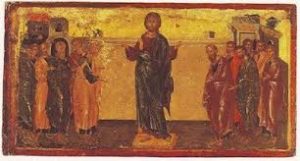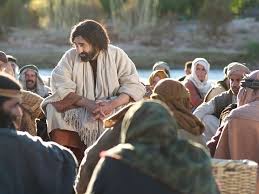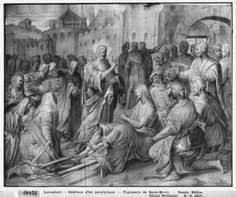This article deals with Jesus’ early ministry.
John Davis gives a succinct history of Jesus’ ministry in the fourth edition of The Dictionary of the Bible: “The news came that John the Baptist had been cast into prison by Herod Antipas. The work of the herald was over. The old Jewish church had been sufficiently called to repentance and reformation, and she had refused to listen. Jesus began forthwith in Galilee to preach the kingdom of God, to announce the germinal principles and the new dispensation, and to gather the nucleus of the future church. The great Galilean ministry of Jesus lasted about sixteen months. He took for his center the busy mart of trade, Capernaum. In Galilee, he was in the midst of a population prevailingly Jewish, yet in a region removed from interference by the religious authorities of the nation.”

Reading further, the ministry is laid out for us: “His evident purpose was to set forth the true, spiritual kingdom of God, and by mighty works convince men of his authority and the character of the kingdom. He asked for faith in himself. He unveiled the real character of God and his requirements for men. He did not apply to himself the name Messiah, for carnal minds would have too easily misunderstood it. He generally called himself the Son of Man.”
Although seemingly a religious description, the above describes Jesus’ revelation—to unveil God’s true character, which will later be described as loving, assisting others toward redemption, but rendering judgment only if needed. God resists judgment.
SON OF MAN
 In Enoch I, v.46.2, “And I asked the one—from among the angels—who was going with me, and who had revealed to me all the secrets regarding the One who was born of human beings, ‘ ‘Who is this, and from whence is he who is going as the prototype of the Before-Time?’ ‘ And he answered me and said to me, ‘ ‘This is the Son of Man,* to whom belongs righteousness, and with whom righteousness dwells. And he will open all the hidden storerooms; for the Lord of the Spirits has chosen him, and he is destined to be victorious before the Lord of the Spirits in eternal uprightness. This Son of Man whom you have seen is the One who would remove the kings and the mighty ones from their comfortable seats and the strong ones from their thrones. He shall loosen the reins of the strong and crush the teeth of the sinners. He shall depose the kings from their thrones and kingdoms. For they do not extol and glorify him, and neither do they obey him, the source of their kingship [from where the kingdom was bestowed upon them]. The faces of the strong will be slapped and be filled with shame and gloom. Their dwelling places and their beds will be worms. They shall have no hope to rise from their beds, for they do not extol the name of the Lord of the Spirits.” “…They manifest all their deeds in oppression, all their deeds are oppression. Their power (depends) upon their wealth. And their devotion is to the gods they have fashioned with their own hands. But they deny the name of the Lord of the Spirits. Yet they like to congregate in the houses and (with) the faithful ones who cling to the Lord of the Spirits.”
In Enoch I, v.46.2, “And I asked the one—from among the angels—who was going with me, and who had revealed to me all the secrets regarding the One who was born of human beings, ‘ ‘Who is this, and from whence is he who is going as the prototype of the Before-Time?’ ‘ And he answered me and said to me, ‘ ‘This is the Son of Man,* to whom belongs righteousness, and with whom righteousness dwells. And he will open all the hidden storerooms; for the Lord of the Spirits has chosen him, and he is destined to be victorious before the Lord of the Spirits in eternal uprightness. This Son of Man whom you have seen is the One who would remove the kings and the mighty ones from their comfortable seats and the strong ones from their thrones. He shall loosen the reins of the strong and crush the teeth of the sinners. He shall depose the kings from their thrones and kingdoms. For they do not extol and glorify him, and neither do they obey him, the source of their kingship [from where the kingdom was bestowed upon them]. The faces of the strong will be slapped and be filled with shame and gloom. Their dwelling places and their beds will be worms. They shall have no hope to rise from their beds, for they do not extol the name of the Lord of the Spirits.” “…They manifest all their deeds in oppression, all their deeds are oppression. Their power (depends) upon their wealth. And their devotion is to the gods they have fashioned with their own hands. But they deny the name of the Lord of the Spirits. Yet they like to congregate in the houses and (with) the faithful ones who cling to the Lord of the Spirits.”
*”Man” in this context means “people” or “human beings.” Though this passage could be rendered “Son of human beings,” to avoid unnecessary confusion…” James H. Charlesworth (editor), Old Testament Pseudepigrapha, vol. 1, 1st Enoch. Highly recommended, many scholars contribute.
 Verse 48, “At that hour, that Son of Man was given a name, in the presence of the Lord of Spirits, the Before-Time; even before the creation of the sun and the moon, before the creation of the stars, he was given a name in the presence of the Lord of the Spirits. He will become a staff for the righteous ones in order that they may lean on him and not fall. He is the light of the gentiles and he will become the hope of those who are sick in their hearts. All those who dwell upon the earth shall fall and worship before him; they shall glorify, bless, and sing the name of the Lord of the Spirits. For this purpose he became the Chosen One; he was concealed in the presence of (the Lord of the Spirits) prior to the creation of the world, and for eternity. And he has revealed the wisdom of the Lord of the Spirits to the righteous and holy ones…and because they will be saved in his name and it is his good pleasure that they have life.” Closing with, and describing those who are not of him, “For they have denied the Lord of the Spirits and his Messiah. Blessed be the name of the Lord of the Spirits.”
Verse 48, “At that hour, that Son of Man was given a name, in the presence of the Lord of Spirits, the Before-Time; even before the creation of the sun and the moon, before the creation of the stars, he was given a name in the presence of the Lord of the Spirits. He will become a staff for the righteous ones in order that they may lean on him and not fall. He is the light of the gentiles and he will become the hope of those who are sick in their hearts. All those who dwell upon the earth shall fall and worship before him; they shall glorify, bless, and sing the name of the Lord of the Spirits. For this purpose he became the Chosen One; he was concealed in the presence of (the Lord of the Spirits) prior to the creation of the world, and for eternity. And he has revealed the wisdom of the Lord of the Spirits to the righteous and holy ones…and because they will be saved in his name and it is his good pleasure that they have life.” Closing with, and describing those who are not of him, “For they have denied the Lord of the Spirits and his Messiah. Blessed be the name of the Lord of the Spirits.”
These two paragraphs encapsulate the Essene belief in a divine being who will be sent to Earth, who is revealed as Messiah. Most scholars believe the Enoch I text to have been written during the Greek occupation (332-144 BC). Its revelatory nature (apocalyptic) gathers not only the Essene but those of the Pharisee movement (apocalyptic Pharisees) who shared similar views. ‘Son of Man’ is not used in the above context in earlier scripture, which would lead one to believe this is a long-held secret and is not a made-up belief to suit circumstances. The messianic vision had been long-standing. There are many scriptures denoting that a messiah will arrive, such as Deut. 18.14-15, Gen. 49.10, Is. 7.14, and others, but Son of Man is a unique terminology.
As a general usage, “son of man” is peculiar in identifying oneself, but used as “the Son of Man” is generally taken as a title, with the article “the” indicating specificity. With Matt. 8.20, referring to foxes having holes but the Son of Man has no place to rest, signifies a specific ‘set apart’ relationship to God that the average man does not have to endure. The Matthew scripture (also, Lk. 9.28) points to a greater burden than others may carry. All men in those days would have relatives with whom to seek shelter during hard times, but this reference by Jesus seems to exclude any normalcy relative to shelter, safety, or even worse, that he is always exposed to the machinations of the world and with no safe harbour. This usage of Son of Man now takes on dimension and moves us past any normal circumstances an average man may confront. That being so, Jesus moves beyond any reference to the ‘average man’, and must be designated a peculiar or special man.
Adamic man is perceived as especially created. Much like Adam, the Son of Man is a special creation, connotating foremost a spiritual being and secondarily an incarnate or physical being. This spiritual/physical understanding asserts the messianic vision that Jesus demonstrated during his ministry. Truly, Jesus was a man in the flesh, but not considered of it, or the world, just in it.
The term Son of Man was seldom used and was an astounding usage for this time. Combined with the thought that Messiah was believed to be the ‘one who will deliver us’, the Deliverer and that almost all Jews assumed the Romans were the only problem—continuing with Davis, “The new ministries of John and Jesus saw past Roman occupation and viewed the corruption within the nation,” [the lack of enlightenment into the Spirit of God, but well studied in the law] “and that an internal cleansing, or conversion, would require that a new seed must be sown.” That new seed would be the Son of Man, the Messiah, Jesus.

Briefly, there has been much discussion concerning Jesus’ visits to India. Many scholars believe he did go to India, but others do not. Buddhism stands as a respected teaching (est. 600 BC) but excluded women and commoners. Its practitioners were only of the royal families, the moguls.
Some Eastern (Buddhist) chronicles indicate that Jesus was thrown out of India by the Brahmins, with death close at hand. Other stories retell Jesus as espousing his Judaic revelation, even while learning what he might have in Buddhist and Brahmic environments.
The inclusion of the Mogul families and Brahmans, to the exclusion of the lower castes, led Jesus to change judgmental influences within Judaism.
The caste system practiced throughout India left the poor without a higher understanding, not to mention a pathway that could be followed.

Saint Thomas proselytized India,
martyred by Brahmins, AD 72.
6 million Christians worship in India today.
∞
BEGINNING
It is in Lk. 5: 9-11, we observe: “For he (Simon) and all who were with him were astonished at the catch of fish they had taken; (10) and so also were James and John, the sons of Zebedee, who were partners with Simon. And Jesus said to Simon, “Do not be afraid. From now on you will catch men.” (11) So when they had brought their boats to land, they forsook all and followed him.”

Jesus calls those who have been waiting,
his friends: “Simon called Peter, Andrew his brother… James the son of Zebedee, and John his brother,” Mt 4.18.
Previous to the formal calling of brothers Simon and Andrew and brothers James and John, Jesus taught in the area of Capernaum. His reputation as a Rabbi (teacher) seems without question, as scripture indicates. Specific preparatory practice is always initiated before formal ministry proceeds, and the Galilean ministry now begins:
Lk. 4.14, “Then Jesus returned in the power of the Spirit to Galilee, and news of him went out through all the surrounding region. (15) And he taught in their synagogues, being glorified by all.”
“Glorified,” tells us people were well aware of Jesus. The people would spread the word, and some would follow him from one village to the next. In Lk. 4.42: …and tried to keep him from leaving them: (43) but he said to them, “I must preach the Kingdom of God to the other cities also because for this purpose I have been sent.” “Glorified by all,” tells us Jesus became quickly known even from the beginning.
SECRETS OF THE WAY
Early in Jesus’ ministry, Jesus would elevate the basic principles of the Way. These foundational principles would be belief-faith, love-forgiveness, and knowledge-wisdom. The prophets had taught these character elements but the final interpretation and edification had not yet been given—the Essene believed only Messiah could accomplish this task.
Yet, this new exposition of enlightened knowledge, principles never cohesively taught to the population, would remove much of current legalistic doctrine and require a whole new foundation of understanding—the law will reveal everyone’s sin, but it will be love that heals and grace that forgives them. Nor had Judaic teachings yet been interpreted by the Messiah, which would become a much higher level of understanding than given by the prophets. Soul identity, Child of God, the inclusion of women, and acceptance of everyone who comes forth, none of these principles concerning soul nature and the treatment of others had been fully explored.
The early ministry would ground the disciples in these principles: Matthew the tax collector is accepted as a disciple (Mt. 9.9), demonstrating that anyone may be chosen, anyone called; Jesus heals a centurion’s servant (Mt. 8.7), anyone might be healed, especially should they ask; in chapter five of Matthew, Jesus gives the Beatitudes and speaks of universal love, to be merciful toward others, to seek purity of heart to see God. In 7.7-11, Jesus urges the people to keep asking and seeking, offering a message of hope and not abandoning God’s promise. Following in Matt. 7.12: “Therefore, whatever you want men to do to you, do also to them, for this is the Law and the Prophets.” He explains the law of spiritual love and gives us the law of reciprocity and wholeness, to which the written Law is subject.
Jesus begins to reveal the secrets of God’s kingdom.
Previous prophets had only
hinted at such things.
Even though at times mysterious, Jesus is more often explicit as he explains the enlightenment into God, or what later becomes known as the Way. He tells us that if the kingdom of God is within you [and a king must inhabit his kingdom], then God is with you always, not just outside of self as the Jews of that day believed. God is ever-present within, and that His kingdom lives within, will later become the revolutionary teaching for the world.
These are secrets that those of the higher Essene priesthood would not want to be revealed, for these secrets are for the elect and not to be shared outside the priesthood. “He shall conceal his counsel among the men of injustice, but he shall impart true knowledge and righteous judgment to those who have chosen the Way, to each according to his spirit and according to the rule of the age, guiding them with knowledge,” Community Rule, VIII, Cave 4 (IQS ix, 15-x, 3), translation Geza Vermes, The Complete Dead Sea Scrolls in English. Jesus begins to reveal the very secrets meant not to be revealed! For those who perceived themselves as holy, and the Ossaean Community in Qumran surely did, Jesus personifies the Wicked Priest, indeed.
“For nothing is secret that will not be revealed, nor anything hidden that will not be known and come to light,” Lk. 8.17 known as the Parable of the Revealed Light (also Lk. 12.1-3). Lk. 8.18, “Take heed how you hear (understand). For whoever has, to him more will be given; and whoever does not have, even what he seems to have will be taken from him.”
The Sadducees seem to have, yet they will become diminished. The Pharisees faced a similar confrontation. Jesus tells the people how to walk with God and reveals the attributes of the true pathway, the basics of which are faith and wholeness with God, bound by love and forgiveness. Being a creative element, the power of love compounds itself, and faith upon faith is still preached in many churches every Sunday (Mt. 9.22). Knowledge and wisdom begin to complete the journey all souls travel. For the follower of Jesus, more is promised, thus more will be added to those who accept the promise.
The mechanics of the enlightened thought teaching are now being made public. John the Baptist introduces the new thought* of equality of station and that the repentance required is no longer directed toward ritual actions, affectations at being more holy, but first requires a shift in basic understanding. A new commitment that is heart-centered, actions taken by the new man, as opposed to being reserved only to the head, the intellect, or the law, will be required.
*New thought: Being a Jew is no longer a place of privilege, Mt. 3.9, for all of God’s children are equal (Children of God).
The love teaching had been mentioned by other prophets but never taught with the same clarity and wisdom. Love predominates all other aspects of the pathway: knowledge is important but without love, it rings hollow; faith may presume great achievements, but not done with love, the achievements are but a shell—love is eternal. “I have come that they may have life, and that they may have it more abundantly” (Jn. 10.10) provides an intent as well as a summation. ‘Follow me’, Jesus says, ‘for this abundant life you always carry with you, which no one can steal.’
The disciples gather in the authority of his message. In Matt. 10.1, the disciples are given the power over unclean spirits, allowing them to “heal all kinds of sickness.” Before that they were baptizing on the Jorden, the disciples were baptizing even as Jesus oversaw them (Jn. 4.1-2). They have now tasted the truth of Jesus’ anointing. They, in their way, experienced anointing power, bringing life (healing) where before spiritual sleep had consumed man.
In 8.26, Jesus rebukes the wind and brings calm. This act expresses authority but offers a powerful and practical example pointing to the storms that afflict each man or woman. How a person speaks, even within themselves, that they may more rely on the spirit of God who calms the turbulent winds. These principles, and others, denote the beginning of Jesus’ ministry. The fulfillment of the law is fully counterbalanced with the underlying spiritual law that moves these legal principles, and that becomes the true fulfillment of the law, the emphasis upon the heart teaching, not merely the head teaching is illustrated throughout Jesus’ ministry.

People seldom read the Bible with the thought that Jesus is teaching enlightenment into the spirit of God. Some read scripture with a sense of excitement, sometimes becoming exalted by the words themselves. Still, others read as a literalist and miss the broad-based allegorical meanings, some of which are demonstrated within parable. As to allegory, has anyone heard of a Rabbi who states with belief that Jonah was literally swallowed by a big fish? There may be a few, but I have yet to hear of one. To explain, for non-seagoing people, the giant of the sea symbolizes a horrible entrance into conviction and mammon. Storm-tossed seas are friendly to no one, requiring repentance or a return to the pathway God has for each person. Jonah teaches a simple lesson but with graphic details.
Others read the biblical text but can understand only the superficial meaning. Still, others understand more, but the enlightenment message is missed (see Mt. 13.10-17). They become those who hear but do not comprehend or who comprehend but do not do, but they are more than willing to preach the gospel. Knowing (knowledge) and accomplishment (implementation) are two different things. By habit, we tend to remain under the law, even personal law or limitations, and thus cannot truly actuate our awakening. Following the previous Matthew scripture (13.10-17), dealing with parables (lessons) and understanding (clarity, cognition), Jesus reveals one of his primary principles: he delineates the Parable of the Sower. Not only that he is the sower, but that others, much like the disciples had already done, may also take up this task. This calling forth is of the spirit, not of the mindedness of men, nor can it come from ourselves as we now are, but from the transition into a spirit led life.
Accepted by many as the essential enlightenment practice, sowing good seeds will begin to reveal God from within, known to many as the kingdom within.  By practicing the principles of the Parable of Sowing Good Seed, revelation will follow as to when to sow and what to sow for.
By practicing the principles of the Parable of Sowing Good Seed, revelation will follow as to when to sow and what to sow for.
Jesus’s enlightenment teachings always unite two fundamental functions, the one we denote as practical in the physical, and the other which more obviously expresses a practical spirituality. No farmer plants seed merely to enhance the ground; he casts his seed so he may reap a crop!*
*see Parables
The Parable of the Sower illustrates common sense or practical knowledge applied in our physical world. We must sow seed to the spirit, else we become caught up in yet another version of ourselves, cause and effects leading to circumstances that become repetitive. All have visited and spent time with this repetition. The Parable of the Sower illustrates that we should sow relative to spiritual matters that concern the self. The saying, ‘so above, so below’ expresses this relationship, “Whatever you bind on earth will be bound in heaven, and whatever you loose on earth will be loosed in heaven,” Matt. 18.18. The interrelationship of heaven and earth (spiritual and physical) is practical and whole, intimately connected.
Jesus seeks that plain of enlightenment that asserts a profound cause-and-effect teaching, the awakening, and one that moves to the core of each man, his very thinking. Jesus’ teaching has no formal rules we observe with the Pharisees. The Pharisaic cleanliness rituals carry with them no spiritual root, and accompanying prayers are either wrongheaded or mere shadows and reflections of true enlightenment. Jesus arrives instead at the root of mind and spirit, thought itself—actions bring accountability, either good or bad, but attitude, intent, and purpose reveal the heart and must also be accounted for.
A foundational disciplined ministry now takes form. If Jesus dwelt in Capernaum, then Simon,* Andrew, James, and John would have had ample time to learn at the feet of Jesus. Jesus’ ministry was from the beginning much like John’s ministry,** bursting out of itself and expanding rapidly. The disciples would have viewed the spiritual authority of Jesus, had already accepted him to some degree, and were ready and prepared to move forward when called.
Jesus speaks by the sea.
Capernaum was modern for its time.
A new city, it developed into
a bustling trading center.
Jesus heals paralytics.
* NIV Lk. 4.13 notes: Capernaum is a sizable town. Simon Peter’s house was a base of operations, fulfilling Messianic prophecy from Isaiah, as the public ministry is near Zebulon & Naphtali.
** John’s ministry occurred during a Sabbatic year, as was the beginning of Jesus’ ministry, which allowed for less labor and allowed for increased spiritual seeking. For this reason, John attracted large listening audiences, touching many thousands. Those who visited the Jordan River would undoubtedly have spoken of John or Jesus to others.
We know that crowds pursued Jesus right after the calling of the four fishermen:
Mt. 4.24, “Then his fame went throughout all Syria; and they brought to him all sick people who were afflicted with various diseases and torments, epileptics, and paralytics; and he healed them. (25) And great multitudes followed him—from Galilee, and from Decapolis*, Jerusalem, Judea, and beyond the Jordan.”
*Decapolis is a district of ten cities, mainly of Greek influence, located south and east of the Sea of Galilee. Syria (Acco, Acre) is only a two-day journey. Decapolis is an hour by boat from Capernaum.
This cannot be a ministry ill-planned; it seems well-planned, well-thought-out, and well-guided. This ministry is built stone by stone and initiated into an active and committed ministry force. The idea of Jesus taking his small bedraggled band of disciples from one village to another is simply not true. The early proving of Jesus is now accomplished. We see no random acts; we see acts of purpose. We see men familiar with Jesus, and then we see them called into discipleship. It would be then that the ministry would take its next steps.
It should be noted that the disciples were also younger than Jesus, who is thought to have been thirty. None of the older thinking, the older generation, could function in this new environment. The tradition of younger disciples compared to the age of the teacher is found in Judaism somewhat throughout, even though those who are older may convert to the new discipline.
Jesus would instruct in love and forgiveness, knowledge and wisdom, and his ever-present faith to walk in the Way. These teachings would later form the thought structure and emphasis of the early church.

rewritten, added media 1/20/23; 4/16/24
God Bless!




I truly enjoy reading on this site, it has superb content. “When a man’s willing and eager, the gods join in.” by Aeschylus.